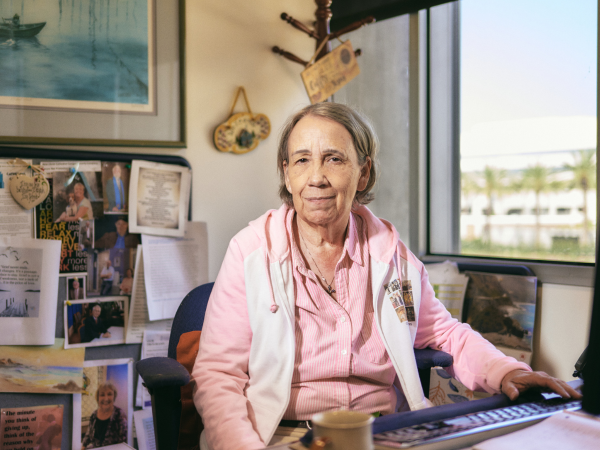It takes a special kind of person to monitor a crisis counseling hotline.
The person must be calm, patient and drawn to others.
Oftentimes, the person has had experience with grief or with those going through hard times, according to Dr. Louise Dunn, director of the New Hope Crisis Counseling Hotline based on the Christ Cathedral campus in Garden Grove.
He or she cannot, however, have a “Superman” complex.
“The person who comes in and wants to be Superman and give people all sorts of advice and tell them what to do – absolutely not,” said Dr. Dunn. “That’s not what we do.”
Dr. Dunn, who started with New Hope as a volunteer call handler in 2001 – during the Schuller and Crystal Cathedral era – explained the role.
“We are active listeners,” she said. “That’s what the training is about. We listen to the person and hear through their emotions what is going on, not just what they’re telling us but how they are feeling about it.”
New Hope Crisis Counseling Hotline, (714-NEW-HOPE), was founded in 1968 by the Rev. Robert Schuller and continued on under Catholic Charities of Orange County when the Diocese bought the cathedral property in 2012.
Dr. Dunn has a bachelor’s in psychology, a master’s in counseling and a doctorate in spiritual formation.
She leads a staff of about 30 volunteers who come into the Tower of Hope for regular shifts.
Their jobs is 100% to answer the crisis hotline.
In addition to have a caring disposition and be willing to undergo training, volunteers must also be Christian.
The multidenominational staff of volunteers – 50% of whom are Catholic – draw from every phase of life.
Volunteers must be over age 18 – but there is no age limit. Currently, the oldest volunteer is 91.
The Assessment
When a call comes in, the job of a volunteer is to take an assessment. The assessment is quite involved – Dr. Dunn says volunteers keep going until they can decipher that the caller is at imminent risk of suicide or not.
There are three vital questions they must ask:
Are you having thoughts of suicide?
If yes,
Do you have a plan?
If yes,
Are you planning on doing this today?
If the answer to all three questions is yes, then the team at the crisis hotline will do outside intervention if possible.
According to Dr. Dunn, the majority of callers to New Hope Crisis Counseling are having suicidal thoughts, which based on suicide statistics, is a large population. However, 75% of people who have suicidal thoughts aren’t going to follow through. For those who have a plan though, it’s a much higher probability that they will follow through.
“We get the people, thank God, who are still ambivalent,” she said. “They don’t really want to die, they just want to stop being unhappy.”
Dr. Dunn said the majority of callers are dealing with depression and anxiety and have no support system.
“Perhaps the person just lost his or her job, and the mortgage didn’t get paid and now they’re homeless,” she said, “or maybe their spouse left them and took the kids.
“A lot of times they have several things going on at one time and don’t know how to prioritize that and it feels like every single thing going wrong is equally difficult,” Dr. Dunn added. “So, we help them prioritize.”
And if the crisis hotline team thinks the caller needs additional services, they will do referrals for counseling, etc.
Some callers even phone in regularly.
When she first started at New Hope, though she empathized with their loneliness, she wondered if her time would be better spent on the phone with those truly in immediate crisis.
But with time and experience her attitude changed.
“The big part of what we do is the counseling that is pre-suicidal,” she said.
The key is to not only help callers at imminent risk of suicide but also to intercept callers before they get to the point of making a plan to end their lives.
“We have several callers who say New Hope saved their lives because they have that connection with us,” added Dr. Dunn.
If you are interested in learning more about volunteering with New Hope Crisis Counseling Hotline, please email Dr. Louise Dunn at [email protected]

